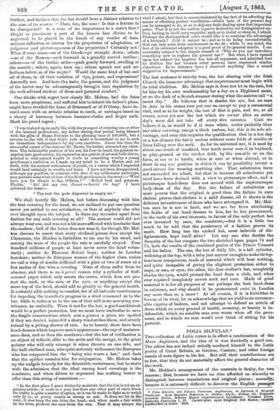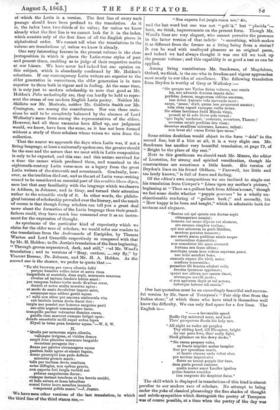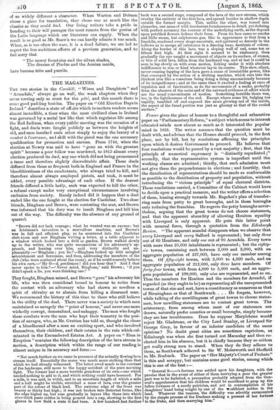FOLIA suxur .A E.*
This collection of Latin verses is in effect a continuation of the Mum Anglicanw, and the idea of it was decidedly a good one. The editor has not indeed strictly confined himself to the Latin poetry of Great Britain, as Grotius, Casimir, and other foreign names of note figure in his list. But still their contributions are so few, that they do not materially affect the general character of the work.
Mr. Holden's arrangement of the contents is faulty, for two reasons ; first, because we have no clue afforded us :whereby to distinguish between translations and original pieces ; secondly, because it is extremely difficult to discover the Fnglish passages
• Folio Bilvulae, site Edogae Poetartars Anglicorant, in Latinum et Grateuns Conversae. Qua disposuit Hubertus A. Bolden, LLD., Collegi 85. Trinitatis qyottdsm Socius, 8cholae Regis Gippesviceus:s latformaton Volumen Prius, oontinens Fassieulos 1., II. Cantabrigiac: spud Deighton BeU Socios ; yeudtmt Lonellui Beg et Daldy. 1865.
of which the Latin is a version. The first line of every such passage should have been prefixed to the translation. As it is, the index loses two-thirds of its value ; for unless we know already what the first line is we cannot look for it in the index, which consists only of the first lines of all the English pieces in alphabetical order. We cannot tell what the translations in the volume are translations of, unless we know it already.
One very interesting feature in the present volume is the close juxtaposition in which it places the Latin-verse styles of past and present times, enabling us to judge of their respective merits at our leisure. We have never had indeed but one opinion on this subject, which is abundantly confirmed by Mr. Holden's selections. If our contemporary Latin writers are superior to the elder generation in correctness, the elder generation is in turn superior to them both in vigour and in feeling. At the same time, it is only just to modern scholarship to note that good as Mr. Holden's Folia undoubtedly are, they can hardly be held to repre- sent the cream of our modern English Latin poetry. Neither Mr. Shilleto nor Mr. Merivale, neither Mr. Goldwin Smith nor Mr. Conington, are among the contributors. Nor can these omis- sions be said to be completely balanced by the absence of Lord Wellesley's name from among the representatives of the elders. However, had all these vacancies been filled up, our judgment would, we know, have been the same, as it has not been formed without a study of those scholars whose verses we miss from the collection.
That the nearer we approach the days when Latin was, if not a living language, at least a universally spoken one, the greater should be the ease and the nature that we meet with in Latin composition is only to be expected, and this ease and this nature survived for a time the causes which produced them, and remained to the eighteenth-century Latin verse-men as a legacy from-the great Latin writers of the sixteenth and seventeenth. Gradually, how- ever, as the tradition died out, and as the art of Latin verse-writing ceased to be considered an essential part of the eruditio libero digna, men lost that easy familiarity with the language which we observe in Addison, in Johnson, and in Gray, and turned their attention rather to the scientific study of it. In other words, the philolo- gical interest of scholarship prevailed over the literary, and the result sof course is that though living scholars can tell you a great deal more about the formation of the Latin language than their grand- fathers could, they have much less command over it as an instru- ment for the expression of-thought.
As specimens of the particular kind of superiority which we claim for the older race of scholars, we would refer our readers to the translations from the Andromache of Euripides, by Thomas Parton and Lord Grenville respectively as compared with that by Mr. H. Holden; to Dr. Jortin's translation of the lines beginning, '" Through groves sequestered, dark, and still," rnd Mr. Wood's translation ; and to versions of "Busy, envious, —rsty fly," by Vincent Bourne, • Dr. Johnson, and Mr. H. A. Holden. As the second one is the shorter, we prefer to quote that :-
"En ubi lucornm per caeca silentia fallit perquo humiles vales inter at antra visas languidula et scatebris, dim repit, murmurs museum riming ad tactum fundere lentus amat : per campum ludens tortie modo flexibus errat, deserit at notes multa moratus agree : et modo de saris• devolvitur impete miro, oceanoque sues addere gestit aquas. o! mihi non sifter per amoena umbracula vita sub latebris tutum devia ducat iter :
iurgia nec possint nec honoree sanguine parti nec sitis argenti commaculare lams.
tranquillo pariter volvantur flumina curs;
gaudia cum marcent cumque fatigat opus: deinde seneetutis molli super ardna lapsu
Elysii in tutee pure ferantur aquas."—W. S. W.
IL "Qualls per nemorum nigra silentia,
vallesque irriguas, at virides domos
serpit fens placidus murmurs languido secretum peragens iter : flexes per patrices circumagons aquas paulum ludit agros et sinuat fngam, donee praecipiti lam pede defluns miscetur gremio maris : tails per tacitam devia semitam aetas diffugiat, non opibus gravis, non experts Pori iurgia turbidi ant palmae sangnineum decks : °unique instant tenebrae et lux brevis occidit, et ludo satura at fessa laboribtts somni frater iners membra iacentia
component gelida mane."—J. Joarra.
We have seen other versions of the last translation, in which the third line of the third stanza ran,—
"Non expert& Pori jurgia =ma nec," &c.,
and the last word but one was not " geliila," but " placida "- both, we think, improvements on the present form. Though Mr. Wood's lines are very elegant, who cannot perceive the presence in the latter version of that indefir 'a something, which makes it as different from the former as a living being from a statue? It can be read with unalloyed pleasure as an original poem, and indeed we had always thought it was one till we took up the present volume ; and this capability is as good a test as can be applied.
Among living contributors Mr. Sanderson, of Magdalene, Oxford, we think, is the one who in freedom and vigour approaches most nearly to our idea of excellence. The following translation from Dryden is worthy of Gray or Wellesley :—
" Sic vogue nec Tyriae fletus valuers, nog omnia
ira, nee adversis dextera iuncta dais:
perfidus Aeneas, magnoram oblitus amoram,
lam dabat Ansonio vela movonda mari : saepe, mane,' dixit, quism iam properarot amator ; vela oitus rapuit vanaque verbs notus.
Sic etiam lacrymas fudit Minoia virgo, pressit ut in solo litore sola thrum : 'quo Ingle,' exelamat, scalerato, reverter°, Meson ; imeninm secuit perfidus iste viam
desertae auxilium miserans, Lenaee, tulisti :
non levat ahl cures Evius ipso meas."
Some critics doubtless would object to the form " deis" in the second line, but if a blot at all, it is a very slight one. Mr. Sanderson has another very beautiful translation, at page 79, of " Bright be the place of thy rest."
Next to this gentleman we should rank Mr. Munro, the editor of Lucretius, for strong and spirited versification, though his constructions are sometimes a little harsh. His version of Dryden's lines on his friend Oldham, " Farewell, too little and too lately known," is full of force and feeling.
Of the editor's own compositions we are inclined to single ont his translation from Cowper's " Lines upon my mother's picture," beginning at "Thou as a gallant bark from Albion's coast," though we feel some doubt whether " puppis generosa" be a wholly un- objectionable rendering of " gallant bark ;" and secondly, his " How happy is he born and taught," which is admirable both for neatness and elegance.
"Beatus est qui spouts seu doetus sapit obtemperare nemini: honesta cui mons clipous est aheneus, era summa simplex veritas ; qui non minorem se gerit libidine, mortem paratus temnere ; nec servit anrae publicae nimbi nequo sermonibus domestieis ; non aemulatur illo quos evexerit fortuna seu fraus altius ; nescitque quam laws robins asperum paret, nee utile antefert bone.
rumoris capers ills vivit, unica coast's innocentia; parasitus illi frustra adulari velit,
Ernst= tyrannus opprimat ; sperat nec altiora nec casum timet, utrumque servili modo ; si non agrorum degit at sui potons,
habetque habons nil omnia."
Our last quotation must be an exceedingly beautiful and success- ful version by Mr. Snow of Tennyson's " Fair ship that from the Italian shore," of which those who have tried it themselves well know the difficulty. We can only find space for a few lines. The English is— "--a favourable speed Ruffle thy mirrored mast, and lead Thro' prosperous floods his holy urn.
"All night no ruder air perplex Thy sliding keel, till Phosphor, bright As our pure love, thro' early light, Shall glimmer on the dewy decks."
"Sic eursu propero voles, ut tracts trepidet mains imagine flssi per speculum maris, at fang* emeres unda vehat siren. per noctem imperiosior flatus ne teneat puppis iter tuae, dam purls preen' emicans quails nester amor Lucifer ignibus prime lumine roseidos lam wargente die despieiat foros."
The skill which is displayed in translations of this kind is almost peculiar to our modern race of scholars. No attempt to bring under the yoke of classical phraseology the fine shades of thought and subtle sympathies which distinguish the poetry of Tennyson was of course possible, at a time when the poetry of the day was
of so widely different a character. When Warton and Dobson chose a piece for translation, they chose one as much like the classics as they could find. Our living writers take a pride in bending to their will passages the most remote from the genius of the Latin language which our literature can supply. When the result is as good as Mr. Snow's we can hardly admire it too much. When, as is too often the case, it is a dead failure, we are led to regret the less ambitious efforts of a previous generation, and to feel sorry that
"The mossy fountains and the silvan shades, The dreams of Pindus and the Aonian maids, have become trite and puerile.
































 Previous page
Previous page